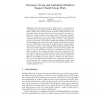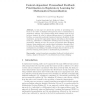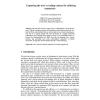UM
2009
Springer
14 years 9 months ago
2009
Springer
Abstract. User behaviors on a system vary not only among individuals but also within the same user when he/she gains experience on the system. We empirically investigated how indiv...
UM
2009
Springer
14 years 9 months ago
2009
Springer
Abstract. Words mean different things to different people, and capturing these differences is often a subtle art. These differences are often “a matter of perspective,” and...
UM
2009
Springer
14 years 9 months ago
2009
Springer
Abstract. The vast amount of information presented in museums is often overwhelming to a visitor, making it difficult to select personally interesting exhibits. Advances in mobile...
UM
2009
Springer
14 years 9 months ago
2009
Springer
Long term group work by small teams is a central part of many learning and workplace activities. Widespread group support tools such as wikis, version control systems and issue tra...
UM
2009
Springer
14 years 9 months ago
2009
Springer
Abstract. In this paper we address the problem of prioritising feedback on the basis of multiple heterogeneous pieces of information in exploratory learning. The problem arises whe...
UM
2009
Springer
14 years 9 months ago
2009
Springer
The web has become a major source of information to learn about a topic. With the continuous growth of information and its high connectivity, it is hard to follow only the links th...
UM
2009
Springer
14 years 9 months ago
2009
Springer
When developing an Adaptive Learning System (ALS), users are generally consulted (if at all) towards the end of the development cycle. This can limit users’ feedback to the chara...
UM
2009
Springer
14 years 9 months ago
2009
Springer
To provide personalized health recommendations concerning disabled persons, an adaptive system needs a detailed user model that can account for the peculiar aspects of the many exi...
UM
2009
Springer
14 years 9 months ago
2009
Springer
Clustering of search results has been shown to be advantageous over the simple list presentation of search results. However, in most clustering interfaces, the clusters are not ada...
UM
2009
Springer
14 years 9 months ago
2009
Springer
Abstract. Traditional websites have long relied on users revealing their preferences explicitly through direct manipulation interfaces. However recent recommender systems have gone...



